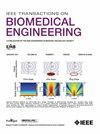LMI-Enabled Absolutely Stabilizing PID Control of Pharmacological Systems for Closed-Loop Automated Intravenous Drug Administration
IF 4.4
2区 医学
Q2 ENGINEERING, BIOMEDICAL
引用次数: 0
Abstract
求助全文
约1分钟内获得全文
求助全文
来源期刊

IEEE Transactions on Biomedical Engineering
工程技术-工程:生物医学
CiteScore
9.40
自引率
4.30%
发文量
880
审稿时长
2.5 months
期刊介绍:
IEEE Transactions on Biomedical Engineering contains basic and applied papers dealing with biomedical engineering. Papers range from engineering development in methods and techniques with biomedical applications to experimental and clinical investigations with engineering contributions.
 求助内容:
求助内容: 应助结果提醒方式:
应助结果提醒方式:


